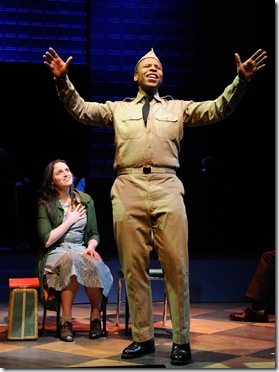Violet: A Stirring Musical
Photo: Glenn Perry. “Alison McCartan and Dan Belnavis in Speakeasy Stage production of Violet.
The 2015-2016 season marks Boston’s SpeakEasy theatre’s twenty-fifth year. To celebrate the event, artistic director Paul Daigneault has brought back the musical Violet, which he first staged in 2000.
Violet is a dramatic and emotional piece, composed by Jeanine Tesori, adapted from Doris Betts’s story “The Ugliest Pilgrim” by the lyricist Brian Crawley. It is somewhat expressionistic in style in that it is achronological, moving back and forth from Violet’s childhood to 1965, the play’s present. As a young girl (Audree Hedequist), was struck in the face with an axe and left disfigured. How disfigured, the audience never learns, since the actress’s face is unmarked. Other characters comment on her scar, but we see no one shun her. Self-conscious, she keeps a lock of hair covering one side of her face much of the time.
Having inherited a little money after her father’s death, the adult Violet (Alison McCarten) takes a Greyhound from the small town of Spruce Pine in North Carolina to Tulsa, Oklahoma in the hope of being miraculously cured by a television evangelist (John F. King). She dreams of looking like the movie stars in the magazines she pores over.
En route, she meets two soldiers, one white, the other black. Without meaning to be cruel, she makes hurtful, prejudiced remarks to Flick, the African-American (Dan Belnavis) who, nevertheless, is drawn to her. She impresses both men with her poker playing skills. Monty (Nile Scott Hawver), a womanizer, flirts with her in expectation of getting her into bed. His feelings become warmer and more sincere over the trip.
Ultimately, the televangelist (John F. King) can do nothing for Violet. Through her experiences, she learns that she needs to give up her resentments and fears. With that realization, the child Violet, who has accompanied her into adulthood, departs and the grownup Violet enters into a relationship with Flick. While it is an engaging show, its simplistic, happy ending is hokey.
Violet is well directed and the performers, strong. Alison McCartan who was excellent in SpeakEasy’s 2014 production of the straight play Bad Jews brought the same richness of character, energy, and originality to Violet. Here, the Boston Conservatory graduate is a belter, when need be, with a sweet voice when called for. Dan Belnavis is a powerful actor/singer who excites the audience in his rousing solo, “Let it Sing.” Michael Mendiola, Violet’s widowed father, is moving as he teaches her to play poker to give her the strength she will need to survive in an often cold world. Audree Hedquist is believable as young Violet, helped out by her resemblance to Alison McCartan.
Unfortunately, David Connolly’s choreography is simple and unexciting, perhaps because dance is not the forte of most of the cast.
Tesori’s music follows Violet’s physical and emotional journey, beginning with an Appalachian sound, moving to rhythm and blues, rock, and gospel.
Eric Levenson’s scene design is spare and practical. A greyhound symbol hangs over an entrance. The buses are created using mid-twentieth-century kitchen chairs. A bed is brought on to represent a brothel. The terrific seven piece band faces upstage right.
Violet plays through February 6 at the Calderwood Pavilion Theatre, Boston Center for the Arts.
Music by Jeanine Tesori Lyrics and Book by Brian Crawley
Directed by Paul Daigneault
Musical Direction by Matthew Stern
Choreography by David Connolly
Scenic Design by Eric Levenson
Sound Design by Charles Schoonmaker
Lighting Design by Karen Perlow
Sound Design by David Remedios
Cast: Dan Belnavis, Tyla Collier, Patrick Greeley, Nile Scott Hawver, Audree Hedequist, John F. King, Stephen Markarian, Alison McCartan, Michael Mendiola, Carolyn Saxon, Kathy St. George
